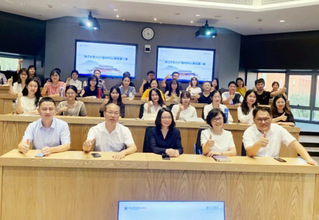报告人:Dr HU, Nan, University of Wisconsin at Eau Claire, Singapore Management University
报告题目1:Interlock Social Capital, Firm Value and Market Efficiency
报告题目2:Blog Exposure, Media Coverage, and the Cross-Section of Stock Returns
报告时间:2010年6月24日上午10点
报告地点:1002会议室
主持人:陈熹博士
报告人简介
Nan HU is an Assistant Professor of Accounting & Finance at the University of Wisconsin at Eau Claire. He is also an Assistant Professor of Information Systems at the Singapore Management University. Before that, he was a senior analyst for Capital one.
Nan’s research focuses on investigating the value implications and market efficiency of both traditional information (e.g. company financial report, analyst forecast, corporate governance, etc) and non-traditional information (e.g. blog opinion, online consumer reviews, etc), using a combination of theories from accounting, finance, marketing, information economics, sociology, psychology, and computer science. Nan’s research has been accepted to published at IEEE Transaction on Engineering Management, JMIS (Journal of Management Information Systems), CACM (Communications of the ACM), DSS (Decision Support Systems), JCS (Journal of Computer Security), and IT&M (Information Technology and Management). His research has been well recognized by academy and industry players. For example, his study about the quality of online review has been widely cited by researchers from marketing science, information systems, and computer science and has been inquired by Amazon.com and referred by various websites and online bloggers. His CIO research has been featured by CIO Insight magazine. And in 2009 he and his co-authors’ CIO compensation study won the McGraw-Hill/Irwin distinguished paper awards from the Society for the Advancement of Information Systems.
Dr. Goes’ research interests are in the areas of design and evaluation of IT-enabled business models, innovation exploration, emerging technologies, online auctions, database technology and systems, and technology infrastructure. His research has appeared in several journals including Management Science, Management Information Systems Quarterly, Information Systems Research, Journal of MIS, Operations Research, INFORMS Journal on Computing, IEEE Transactions on Communications, IEEE Transactions on Computers. Dr. Goes has been Senior Editor of Information Systems Research, and is or has recently been Associate Editor of Management Science, Decision Sciences, Journal of Management Information Systems, Production and Operations Management and the INFORMS Journal on Computing.
报告内容摘要:
Talk 1: Interlock Social Capital, Firm Value and Market Efficiency
In this paper, we come up a new interlock social capital measurement incorporating both the number of interlock links as well as the importance of each link within an interlock network. We hypothesize that such an interlock social capital network measurement represents the social position of a firm within an inter-connected world which will enable a firm to have better access to information, human capital, financial capital, suppliers, etc; hence, resulting in an increased future profitability and improved market valuation. Based on the interlock of public trading firms, we document that interlock social capital is incrementally informative about a firm’s future profit margin, market valuation, but not its future asset turn over, revealing that interlock social capital impacts performance through acting as a differentiation resource instead of playing a cost leadership role.
Talk 2: Blog Exposure, Media Coverage, and the Cross-Section of Stock Returns
This paper investigates the relation between a firm’s visibility in blog spaces, termed blog exposure, and the cross-sectional stock returns. We show that blog exposure is fundamentally different from the traditional media coverage, and securities with low blog exposure earn higher returns than stocks with high blog exposure. We further illustrate that such an effect is more prominent for stocks with low institutional ownership. Contrary to traditional media coverage, the return premium associated with blog exposure cannot be explained by either the illiquidity hypothesis or the investor recognition hypothesis based on rational agent framework. Instead, our results suggest that blog effect stems from the limited attention theory and cannot be arbitraged away due to short-sales constraints. Our research points out the importance of blogs in information dissemination, especially for the stocks with limited attention.





